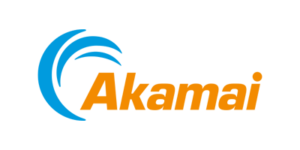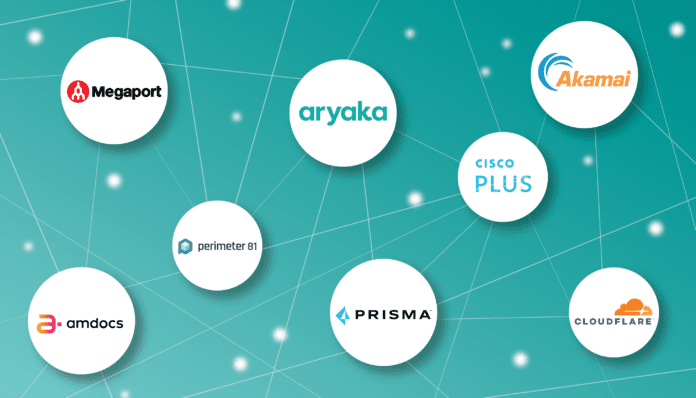Network-as-a-Service (NaaS) refers to a cloud service model of leasing networking services from cloud providers. With NaaS, customers can manage and run their own networks without having to maintain their own network infrastructure. NaaS providers enable their customers to set up their own networks without hardware, instead using software delivered over the internet.
NaaS is capable of replacing several legacy network configurations such as multi-protocol label switching (MPLS) and virtual private networks (VPNs), as well as on-premises networking hardware like firewall hardware and load balancers.
Table of Contents
Best NaaS Providers
There are many NaaS providers on the market today. The ones covered in this article are just a fraction of what’s available, selected for having standout features and reputations in the industry. Here are some of the top NaaS providers for 2023:
Perimeter 81: Best overall NaaS provider

Perimeter 81 is a top network cybersecurity company that delivers remote access and network capabilities managed over a multi-tenant cloud and provides high scalability for users around the globe. Its managed network service is easily integrated with cloud and local network resources for swift onboarding.
Key features
- One-click encryption across the network
- A single central platform to enable IT to manage all cloud and local resources
- Automatic Wi-Fi security, two-factor authentication (2FA), DNS filtering and more
- Extensive auditing and reporting capabilities
- Multiple public and private gateways around the world
Pros
- Cloud-native NaaS enables users to integrate network and security capabilities into their cloud-based SaaS applications.
- A sophisticated set of security tools to complement regular networking features.
- Total network visibility simplifies how organizations identify the occurrence of exposure.
- Global data backbone of over 50 managed data centers.
- Lower IT costs, since it’s possible to manage all network aspects from a single panel.
- Zero trust remote work supports and secures remote employees.
Cons
- Perimeter 81 may be pricier than its alternatives, with the most useful features available in the costliest tiers.
- Some users report that logging features are inconsistent.
Pricing
Perimeter 81 offers four pricing plans:
- Essentials: Provides all the basics required to secure and manage networks. Starts at $8 a month and serves a minimum of ten users.
- Premium: For $12 a month a minimum of 10 users get access to advanced network security management features.
- Premium Plus: Costs $16 per month and serves a minimum of 20 users. This tier offers more layered security and network for larger organizations.
- Enterprise: The pricing information for this tier is available upon contacting Perimeter 81. Its enterprise-ready security features serve a minimum of 50 users.
Though the company doesn’t offer a free trial, they do have a 13-minute demo presentation available on their website.
Cloudflare: Best for zero trust and DDoS protection

Cloudflare is a global cloud platform that delivers a variety of networking services to businesses all over the world to improve the security, reliability, and performance of their critical internet properties without the complexity and cost of managing legacy network hardware.
It offers Cloudflare Magic WAN—an enterprise NaaS solution designed to replace hardware appliances and WAN technologies with one network—and Magic Transit, which protects network infrastructure and data centers against distributed denial-of-service (DDoS) attacks, among other services.
Key features
- Magic Firewall, a network-level firewall for enterprise security
- Zero trust security for continuous monitoring and validation, micro-segmentation, multifactor authentication (MFA), device access control (DAC), and more
- DDoS protection and traffic acceleration via Magic Transit
- Network Interconnect for the direct connection of on-premises networks to the Cloudflare network
Pros
- Easy deployment and management
- Consistent speed and security anywhere globally
- Easy to use and integrate with endpoints and cloud providers already in use
Cons
- Could benefit from more learning resources and an improved learning portal in general.
- May come off as quite complex to users seeking a simple NaaS tool.
Pricing
Cloudflare’s network services, including Magic Transit, Magic WAN, and Magic Firewall, require prospective users to contact Cloudflare for custom pricing and a demo.
Prisma Cloud: Best for cloud-native security of critical applications and workloads

Prisma Cloud is a product by Palo Alto Networks that empowers enterprises to secure their critical applications across hybrid and multicloud environments. It assists with the effective collaboration of security and DevOps teams to accelerate secure cloud-native application development and deployment by securing applications from code to cloud.
Key features
- Cloud-native application protection to secure applications from code to cloud
- Code Security for shipping secure code for applications, infrastructure, and software supply chain pipelines
- Cloud security posture management
- Cloud Workload Protection to secure hosts, serverless functions, and containers all through the application lifecycle
- Web application and API security
- Cloud Infrastructure Entitlement Management to manage permissions across multicloud environments
- Cloud network security
Pros
- One integrated platform to reduce training and staffing challenges
- Code-to-cloud protection helps avoid friction between security and development teams
- Offers prevention-first protection to defend against zero-day vulnerabilities
- Free trial to test the solution before you buy
Cons
- Steep learning curve, as some users described the UI as complicated and complex to configure.
- It may be pricier than a number of its alternatives.
Pricing
Prisma Cloud offers two editions: Enterprise and Compute. While they don’t list pricing, they do provide an easy guide to what’s included in each edition to help you understand which is more suitable for your business. They also offer a free trial.
Megaport: Best for Software Defined Networking to enable rapid connectivity

Megaport is a leading NaaS provider that uses Software Defined Networking to give its customers rapid connectivity to other services in the Megaport Network. The provider enables its users to deploy global, high availability networks in minutes on its NaaS platform. With Megaport, users can organize all their connections from a single place and bring all their networks together in a simple platform.
Key features
- Direct connectivity to providers on the Megaport Network
- Inter-region/inter-cloud connectivity for control and localization of traffic
- High-speed Ethernet interfaces of 1Gbps, 10Gbps, and 100Gbps
- Secure and private connectivity
Pros
- Point-and-click functionality enables faster and simpler setup and deployment of connections
- Real-time transfer of workloads
- Flexible connections enable customers to scale their bandwidth up or down depending on business growth, changes, and workload transfers
Cons
- Setting up ports may take longer than expected.
Pricing
Megaport offers a scalable, pick-and-choose pricing model with its basic Ports solution starting at $500. You can also request a demo, but not a free trial.
Akamai: Best for Content Delivery Networks (CDNs)

Akamai gives users the ability to implement consistent security policies for their hybrid cloud environments on a global scale. Through the Akamai Intelligent Edge Platform, Akamai’s customers enjoy consistent round-the-clock protection for their applications, websites, APIs, and users, while enabling IT teams to oversee everything from a single pane of glass.
Key features
- DataStream for insight into CDN performance with continuous log data at scale
- Intelligent load balancing to avoid outages and improve application performance
- CloudTest for stress testing websites and applications with intense real-time load testing
Pros
- Secure applications, regardless of where they are hosted
- Fast CDN delivery
- Excellent customer support
Cons
- More expensive than most CDN alternatives
- Suite of offerings can be confusing to navigate
- Some users report that the user interface could be more intuitive
Pricing
Akamai has a broad portfolio of solutions listed on their website. They do not provide pricing, but some include free trials. You can also reach out to their sales team for assistance.
Aryaka: Best for SD-WAN and SASE deployments

Aryaka is a platform that provides a zero-trust WAN to enable enterprises to enjoy a modern SASE solution built for the cloud. The platform converges networking and security to deliver an integrated experience that can be managed from a single dashboard.
Aryaka offers Managed SASE to provide global network connectivity and secure internet access across sites, applications, and users. It also has a Managed SD-WAN service that gives enterprises an adaptable and resilient NaaS to connect users, applications, and clouds globally.
Key features
- Network and security-as-a-service offered as part of Aryaka’s managed SASE
- High-performance WAN to deliver an agile and flexible NaaS
- All-in-one managed service to interconnect enterprises, workers, workloads, support, and more
- Lifecycle services management capabilities integrated with Aryaka’s SASE and cloud-based service delivery platform
Pros
- Fastest SD-WAN and software-defined network on the market
- Greater operational simplicity and lower total cost of ownership (TCO)
- Superior application performance, which improves user experience
- 24/7 operations to ensure constant uptime of enterprise networks
Cons
- Some users report that cold storage is not allowed
- Migration and service incidents have also been reported
Pricing
Aryaka does not provide pricing, trial, or demo information on their website. Interested customers can fill out a contact form to reach out to the sales team.
Converged Cloud Fabric: Best for network automation for private cloud platforms

Arista’s Converged Cloud Fabric is an automated fabric created on cloud networking design principles to deliver a cloud-based NaaS operational model.
Converged Cloud Fabric enables networks to operate at the speed of virtual machines and containers via the automation of networking for multiple private cloud platforms. Its self-service networking and contextual intelligence provide NetOps teams the opportunity to prioritize areas such as analytics and the development of new services.
Key features
- Built-in analytics and telemetry for real-time contextual visibility
- Simplified management and zero-touch workflows
- Self-service networking model with delegated administration to provide teams with cloud-style experience on-premises for VMware, VXRail, and Nutanix HCI workloads
- Scale-out Fabric to provide users with the ability to start at the size and scale that meets their immediate needs while remaining future-proof
Pros
- Effective collaboration among DevOps, NetOps, and CloudOps teams to speed up issue resolution and improve IT productivity
- A self-service network experience
- Automation eliminates tedious tasks
- Highly dependable
Cons
- Very expensive compared to other vendors.
Pricing
Arista does not provide pricing information on their website, but you can reach out to their sales team for more information.
Amdocs NaaS: Best for 5G

Amdocs’ NaaS approach delivers a modular and programmable solution that enables service providers to swiftly design, deploy, and monetize on-demand NaaS offerings for their enterprise customers. It combines cloud and business applications with virtualized network infrastructure and is responsible for the automation, orchestration, and simplification of designing, ordering, and managing network services and value-added services.
Key features
- End-to-end programmable and modular service lifecycle automation and orchestration
- Open ecosystem of pre-integrated third-party virtual network functions (VNFs)
- Automated service factory to handle the whole service lifecycle
- Experience-driven, design-led enterprise self-service portal with network configuration functionality
- A VNF marketplace
Pros
- Faster time to market
- Greater revenue opportunities for enterprises
- Eradication of manual approval and fulfillment opportunities through automation
Cons
- Focuses on providing SD-WAN services to service providers and not directly to enterprises
Pricing
Contact an Amdocs specialist for accurate pricing information.
5 Benefits of Using Network-as-a-Service
There are some strong advantages of using a NaaS provider for companies who don’t have the resources to set up their own network infrastructure—or who would prefer to outsource the setup and maintenance to a dependable partner. Here are the most important benefits of NaaS:
- Flexibility and customization. Cloud services provide greater flexibility and more customization, since network changes can be executed rapidly over-the-air instead of having to wrestle with hardware.
- Scalability. For the same reasons as above, NaaS and cloud services in general provide greater scalability than typical hardware-based services.
- Cost savings. Although this benefit is dependent on the vendor, the choice of subscribing to cloud services such as NaaS as opposed to building your own services often yields cost savings.
- Security. NaaS enables a single provider to deliver both networking and security services such as firewalls to tighten integration between networks and their security.
- No maintenance. The responsibility of network, software and hardware maintenance is on the cloud provider.
Featured Cybersecurity Software
How to Select a NaaS Provider
For an effective NaaS deployment, it’s important to select the right service. Here are key considerations to help ensure you choose the best NaaS provider for your needs:
- Define the service(s) you require. Since NaaS solutions vary greatly, determining your requirements is crucial to help you narrow down potential vendors.
- Ensure the provider’s offerings are compatible. You’ll want to make sure the prospective provider offers services that are compatible with your existing environment. But it doesn’t stop there. Compatibility should also account for applicable networking interoperability factors and standards. You should also consider which of your current SaaS and cloud partners are integrated with the NaaS provider in consideration.
- Compare the cost of the NaaS to a traditional network. Consumption-based models are meant to accelerate digital transformation, optimize scalability, and reduce capital costs and risks. The cost of the NaaS solution shouldn’t just be a cheaper option—it should allow your organization to smoothly approach digital transformation initiatives.
How We Evaluated the Top Network-as-a-Service Providers
We compared lists, insights, individual product reviews, and rankings from websites such as G2, Gartner Peer Insights, and Sourceforge, among others, as well as the individual product offerings listed on providers’ websites, datasheets, and other official resources. We then selected the standout providers, either for their entire feature set or particular areas they excelled in.
Bottom Line: Choosing the Top NaaS Provider for Your Business
To ensure that IT teams today stay abreast of the rapidly evolving pace of business while keeping network complexity manageable and maintaining security, organizations would do well to consider NaaS solutions. Their on-demand or subscription-based plans allow organizations to shift the responsibility of network management to third-party providers, freeing internal resources to focus on more productive work.
Still, it’s important to know that these services do not follow a one-size-fits-all approach but can vary widely in application. Make sure that the solutions in consideration are not only suitable for your use case but can also add value to your organization.
Explore the best network security companies offering comprehensive network security and management tools and services.






